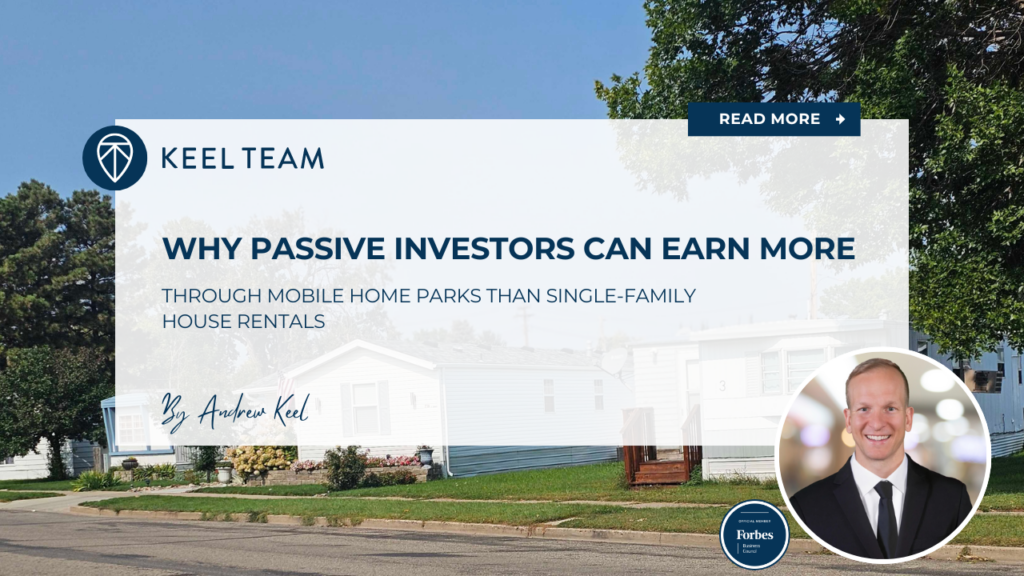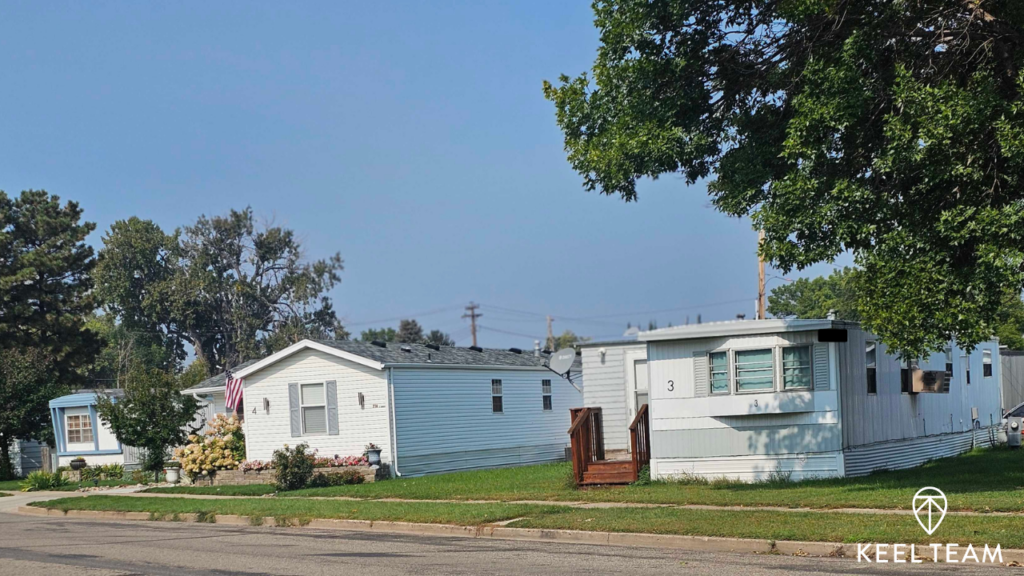Why Passive Investors Can Earn More Through Mobile Home Parks Than Single-Family House Rentals
-
 Andrew Keel
Andrew Keel

When it comes to passive investing in real estate, the goal is clear: maximize returns with minimal effort. Traditionally, single-family home rentals have been a go-to choice for many passive investors. However, mobile home parks (MHPs) have gained attention as an increasingly profitable and lower-risk alternative. Let’s dive into how and why a passive investor can potentially earn more by passively investing in mobile home parks compared to buying single-family house rentals.
1. Potential for Higher Cash Flow and ROI
Mobile home parks often generate higher cash flow and return on investment (ROI) than single-family rentals. This is mainly due to:
- Lower per-unit costs: Mobile home parks generally have more units per property compared to single-family rentals. Each mobile home lot generates rental income, but the landowner doesn’t necessarily own the mobile homes themselves. As a result, maintenance and capital expenditures are lower than for single-family homes.
- Higher cap rates: Mobile home parks typically have higher capitalization (cap) rates, which means better returns on investment. Cap rates for mobile home parks can range from 7-10% or higher, while single-family homes often provide a 4-6% cap rate. A higher cap rate directly translates to a higher return for passive investors.
2. Lower Maintenance Costs
One of the primary benefits of investing in mobile home parks is reduced maintenance responsibility. In many cases, the tenants own their mobile homes, and the trailer park owner is only responsible for the land, utilities, and common areas. This drastically reduces expenses related to property upkeep, such as plumbing, electrical work, or roof repairs—issues that are common and costly in single-family home rentals.
In contrast, single-family home rentals require the owner to manage or outsource maintenance for the entire property, which cuts into profits. With mobile home parks, the trailer park owner generally avoids these costs, leading to better cash flow and overall profitability.
3. Lower Tenant Turnover
Tenant turnover is a costly aspect of managing single-family rentals. Each time a tenant vacates a property, the owner must spend money on cleaning, repairs, marketing, and possibly even vacancy costs. This downtime can add up and reduce overall returns.
Mobile home parks, on the other hand, generally experience much lower tenant turnover. Tenants who own their mobile homes are far less likely to move, given the cost and inconvenience of relocating their homes. This often results in a more stable and consistent cash flow for the trailer park owner.
Are you interested in learning more about passive mobile home park investing? Download my FREE eBook and explore this exciting asset class!
4. Scalability and Diversification
Single-family home rentals require significant capital for each property you add to your portfolio, making it difficult to scale quickly. Conversely, mobile home parks allow for instant scalability. A single mobile home park can have dozens or even hundreds of units (or lots), allowing investors to diversify their income streams and possibly mitigate risk.
This built-in diversification is a significant advantage. If a single tenant vacates a mobile home lot, the impact on total cash flow is minimal compared to losing a tenant in a single-family home, where 100% of the income is tied to one tenant.
5. Favorable Supply-Demand Dynamics
The supply of mobile home parks is limited because local governments rarely approve new mobile home park developments. This creates a situation where the demand for affordable housing (which mobile home parks provide) continues to grow, while the supply remains stagnant. This imbalance pushes occupancy rates higher and allows trailer park owners to gradually raise rents over time without worrying about oversupply.
On the other hand, single-family home rentals are subject to a larger pool of competitors, including new homes and multifamily properties. The market for single-family rentals can fluctuate, and it’s harder to raise rents consistently without losing tenants to newer, better-located properties.
6. Potential Tax Benefits and Depreciation
Mobile home parks come with the same tax benefits as other forms of real estate, including the ability to depreciate the property and write off expenses. However, trailer parks have an added advantage in that investors can depreciate not only the structures but also infrastructure such as roads, utilities, and common areas. This accelerates tax benefits and enhances overall returns for passive investors.
Single-family home rentals also offer depreciation, but because the structure itself usually represents most of the value, depreciation benefits are not as substantial as in mobile home parks, where land improvements can also be written off.

7. Affordability and Entry Costs
Investing in single-family rentals requires significant upfront capital, especially in desirable areas where property values are high. By contrast, investing in mobile home parks can offer a lower barrier to entry. While some trailer parks can be costly, many are available at prices well below those of single-family homes, allowing passive investors to enter the market with less initial capital while benefiting from larger returns.
Additionally, passive investors often participate in mobile home park investments through syndications or partnerships, allowing them to invest small amounts while leveraging professional management and expertise.
8. Recession-Resilience
Mobile home parks tend to perform well during economic downturns because they provide affordable housing. As more people look for cost-effective living arrangements, the demand for mobile homes rises. In contrast, single-family home rentals in mid-to-high price ranges can suffer during recessions, as potential tenants look for more affordable options or struggle to afford rent.
This recession resilience can make trailer parks a more secure investment during times of economic uncertainty, providing a safety net for passive investors seeking stable returns.
Conclusion
For passive investors seeking a stable, cash-flowing asset with high returns, mobile home parks offer a compelling alternative to single-family rentals. Higher cap rates, lower maintenance costs, reduced tenant turnover, scalability, and recession resilience all typically contribute to superior financial performance. While single-family homes have their place, mobile home parks present an opportunity to potentially maximize both profits and passive income while minimizing risk and management burden.
Book a 1-on-1 consultation to discuss:
- A mobile home park deal review
- Due diligence questions
- How to raise capital from investors
- Mistakes to avoid, and more!
Disclaimer:
The information provided is for informational purposes only and is not investment advice or a guarantee of any kind. We do not guarantee profitability. Make investment decisions based on your own research and consult registered financial and legal professionals. We are not registered financial or legal professionals and do not provide personalized investment recommendations.
Andrew Keel
View The Previous or Next Post
Subscribe Below 👇





